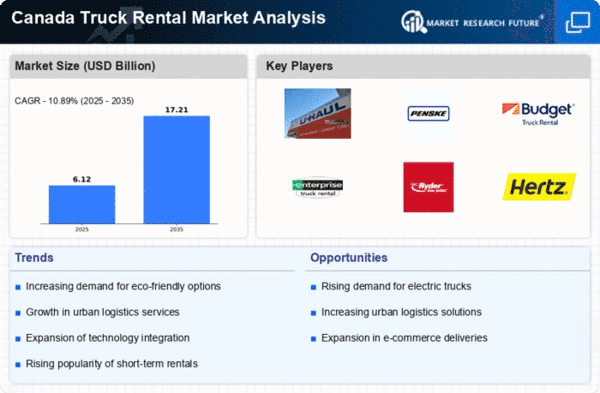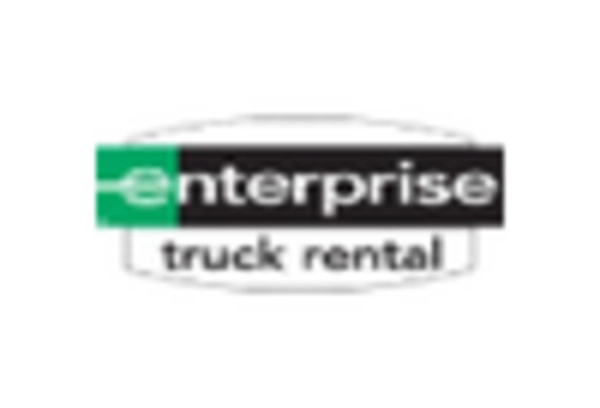E-commerce Expansion
The rapid growth of e-commerce in Canada is reshaping the logistics landscape, which in turn influences the truck rental market. With online shopping becoming increasingly prevalent, businesses require reliable transportation solutions to deliver goods to consumers. In 2025, e-commerce sales in Canada are expected to reach over $50 billion, indicating a robust market for logistics services. This surge in online retailing necessitates the use of rental trucks for last-mile delivery, thereby driving growth in the truck rental market. Companies are likely to seek flexible rental options to accommodate fluctuating demand, further propelling market expansion.
Seasonal Demand Fluctuations
Seasonal variations in demand for transportation services significantly impact the truck rental market. In Canada, certain periods, such as summer and holiday seasons, witness increased activity in moving and logistics. For instance, the summer months often see a spike in relocations, as families prefer to move during favorable weather conditions. This seasonal demand can lead to a temporary surge in rental truck usage, compelling rental companies to adjust their fleet sizes accordingly. The truck rental market must remain agile to capitalize on these seasonal trends. This ensures availability during peak times while managing costs effectively.
Urbanization and Population Growth
The ongoing trend of urbanization in Canada appears to be a significant driver for the truck rental market. As more individuals migrate to urban areas, the demand for transportation solutions increases. This urban influx necessitates the movement of goods and personal belongings, thereby boosting the need for rental trucks. According to recent statistics, urban areas in Canada are projected to grow by approximately 2.5 million residents by 2030. This demographic shift suggests that the truck rental market will likely experience heightened demand as residents seek efficient and flexible transportation options for their relocation needs.
Infrastructure Development Initiatives
Government investments in infrastructure development are likely to bolster the truck rental market in Canada. As new highways, bridges, and transportation networks are constructed, the efficiency of logistics operations improves. Enhanced infrastructure facilitates smoother transportation routes, which can lead to increased demand for rental trucks. Recent government reports indicate that infrastructure spending is projected to exceed $180 billion over the next decade. This investment not only supports the growth of the truck rental market but also encourages businesses to utilize rental services for their logistics needs, as improved infrastructure reduces transit times and costs.
Rising Fuel Prices and Cost Management
the fluctuation of fuel prices critically influences the truck rental market. As fuel costs rise, businesses and individuals may seek rental trucks as a cost-effective alternative to owning and maintaining a fleet. In 2025, fuel prices in Canada are expected to remain volatile, prompting companies to evaluate their transportation strategies. The truck rental market may benefit from this trend, as customers look for flexible rental options that allow them to manage costs effectively. Additionally, rental companies may implement fuel-efficient technologies in their fleets, further appealing to cost-conscious consumers and enhancing market competitiveness.

















Leave a Comment